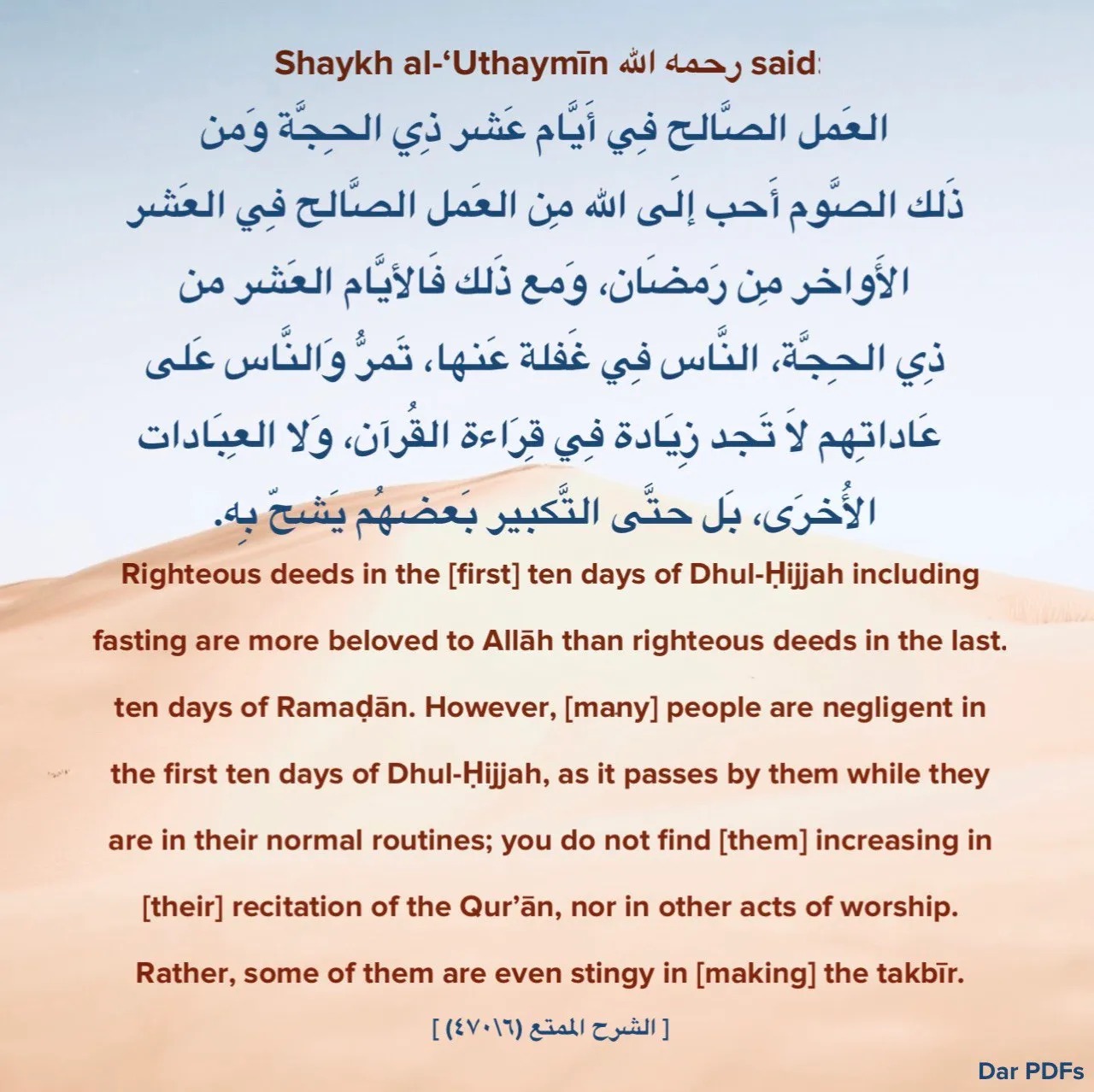Bismillah wa salatu wa salam ‘ala rasulillah
The month of Dhul Hijjah is the twelfth month in the Islamic calendar. Popularly known as the month of Hajj, Dhul Hijjah has in it a lot of virtues which, sadly, not so many Muslims pay attention to or maximize. In recent times, Muslims mostly tend to strive to do more ibaadat during Ramadan leaving off other days in which reward and nearness to Allah can be achieved as narrated in authentic reports. This could either be due to lack of information on their virtues or laziness on the part of the individual.
Part of the bounties of Allah upon us as an Ummah is that He has bestowed upon us multiple avenues – specific days, times and places to seek His pleasure, one of which is the first ten days of the sacred month of Dhul Hijjah.
Ibn ‘Abbas (may Allah be pleased with him and his father) reported that the Prophet (peace and blessings of Allah be upon him) said: “There are no days in which righteous deeds are more beloved to Allah than these ten days.” The people asked, “Not even jihad for the sake of Allah?” He said, “Not even jihad for the sake of Allah, except in the case of a man who went out to fight giving himself and his wealth up for the cause, and came back with nothing.” (Reported by al-Bukhari, 2/457).
This indicates that these days are the best and the most beloved to Allah in the year while the best nights are the last ten of Ramadan which includes Laylatul Qadr. These days are a good time to keep up the tempo in our worship of Allah.
Ways to Maximize the Benefits of the First Ten Days of Dhul Hijjah?
- Fasting – In Islam, one of the exceptional ways to earn the reward of Allah is to engage in voluntary fasts. The recommended fasts as done by the Prophet is the first nine days as the tenth day is the first day of Eid Al Adha. Fasting on the day of eid is prohibited.
Hunaydah ibn Khalid narrated from his wife, that one of the wives of the Prophet (peace and blessings of Allah be upon him) said: The Prophet (peace and blessings of Allah be upon him) used to fast on the first nine days of Dhul-Hijjah and the day of ‘Ashura, and three days each month, the first Monday of the month and two Thursdays. Narrated by An-Nasai and by Abu Dawud.
Fasting on the day of Arafah (9th of Dhul Hijjah) is highly recommended as it is reported that it serves as an expiation for the sins of the previous and coming year. Whosoever finds it difficult to fast on the first eight days should strive to do so on the day of Arafah.
Abu Qatadah (may Allah be pleased with him) narrated that the Messenger of Allah (peace and blessings of Allah be upon him) was asked about fasting on the day of ‘Arafah and he said: “It expiates for the past and coming years.” Narrated by Muslim.
- Engaging in the remembrance of Allah– Continuously saying the Takbeer(Allahu Akbar), Tahmeed (Alhamdulillah), Tahleel(La ilaha illa Llah) and Tasbeeh (Subhanallah) in a tone that prompts others to engage in it. This is one of the best ways to keep our tongues busy.
3. Increasing in Nawafil – Recognizing that good deeds are highly rewarding in this glorious month should be great prompt to engage in observing more nawafil as they are a means to move closer to Allah. Sunan rawatib and salatu duha are from the nawafil we can add to our daily routine.
4. Keeping Kinship Ties – Islam as a religion fosters family bond and the Prophet (peace be upon him) in many narrations has emphasized the importance of keeping ties with our kin. Engaging in this in Dhul Hijjah will even bring more reward than outside of it.
5. Increasing in Charity – Lending helping hands either in cash or kind is highly encouraged.
Like it is encouraged in the other sacred months, Muslims should ensure not to wrong themselves in Dhul Hijjah.
Some Virtues of the First Ten Days of Dhul Hijjah
- Allah swears an oath by them in Surah Al Fajr where he says “by the dawn, by the ten nights.”
- For those who are able to, observing Hajj, Umrah and offering sacrifice are also from the eminent and rewarding deeds during the first ten days of Dhul Hijjah.
- It contains the day of Arafah in which Allah perfected the religion of Islam. The Prophet (peace be upon him) also said fasting on the day of Arafah expiates the sins of the previous year and the one to come.
May Allah make us from those who are able to do more good deeds this sacred month and spare our lives to witness more on earth. Aameen
